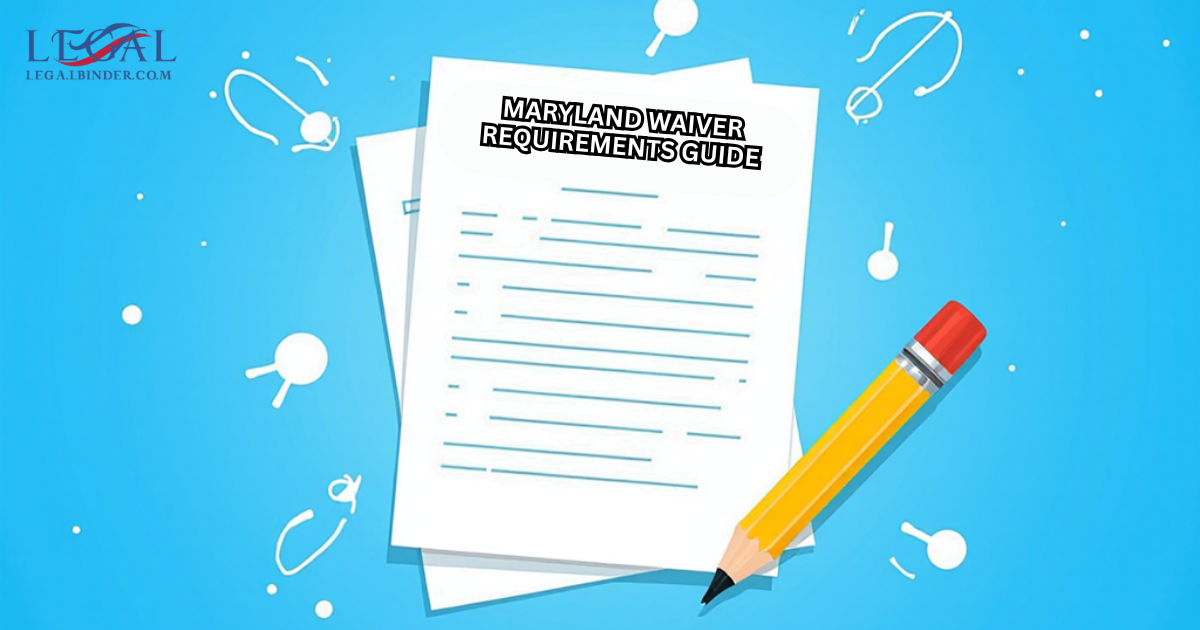Maryland Waiver Requirements — If you need to request relief from court fees, transcript charges, or other public filing costs in Maryland, understanding the state’s waiver requirements is essential. This guide explains Maryland-specific eligibility rules, the exact forms commonly used, step-by-step filing instructions, document checklists, processing times, and where to find authoritative state resources.
Everything below is tailored for Maryland courts and agencies. Follow the steps closely, attach clear supporting evidence, and use the official state links provided to download current forms.
Quick overview — what a Maryland Waiver Requirements covers
In Maryland, a waiver typically asks a court or state agency to excuse payment of fees because the petitioner cannot reasonably afford them. Waivers often apply to:
- Court filing fees for civil, family, or probate matters.
- Transcript costs, certified copies, or appellate filing fees.
- Some administrative fees where Maryland law or agency rules permit relief.
The Maryland judiciary and county clerks evaluate applications on a case-by-case basis using financial affidavits and supporting documents.
State-specific requirements: Maryland Waiver Requirements
Maryland courts use state rules and local administrative procedures when evaluating fee-waiver requests. The decision looks at income, household size, assets, and necessary monthly expenses rather than a rigid income cutoff.
Important Maryland resources:
Residency and filing location: file waiver petitions with the clerk in the Maryland county where the case is pending. For administrative fee relief, follow the agency’s waiver procedures on its official site.
Typical eligibility indicators Maryland Waiver Requirements
- Receipt of means-tested benefits (Maryland Medical Assistance/Maryland Health Connection, SNAP, TANF) strongly supports indigency claims.
- Low income combined with unavoidable expenses (rent, utility arrears, medical costs) may qualify you even if not receiving benefits.
- Incarcerated individuals and pro se filers have separate rules for in forma pauperis status on appeal.
Step-by-step: how to complete & submit a waiver in Maryland
Follow these steps to prepare a complete waiver Maryland requirements packet and reduce the risk of denial or delay.
- Identify the correct form. Go to the Maryland Judiciary forms page and select the appropriate indigency affidavit or fee-waiver form for your court level (district, circuit, or appellate).
- Gather supporting documents. Collect recent pay stubs, benefit award letters, unemployment documentation, bank statements, and a copy of your photo ID.
- Complete the affidavit fully. Provide the court name, case number, household members, all income sources, and monthly essential expenses. Be consistent and precise—judges verify details.
- Sign and swear as required. Maryland forms often require a sworn statement under penalty of perjury; follow notarization instructions when indicated.
- Attach documentary evidence. Include copies of public-benefits letters, pay stubs, and recent bank statements to corroborate your claim of inability to pay fees.
- File with the clerk or agency. Submit in person, by mail, or via e-filing if available in your county. For appellate waivers, file promptly with the Clerk of the Court of Special Appeals or the Court of Appeals as directed.
- Keep proof and follow up. Request a filed-stamped copy, monitor the docket, and respond to any court requests or hearing notices immediately.
Maryland courts commonly expect these documents with a waiver application:
- Maryland Indigency Affidavit or local county fee-waiver form (check Maryland Judiciary Forms for correct files).
- Proof of public benefits (Maryland Medical Assistance, SNAP award letter, SSI/SSDI statements).
- Recent pay stubs (1–3 months) or employer income verification.
- Bank statements for the prior 1–3 months if requested by the court.
- Valid Maryland ID (driver’s license or state ID) and case documents (complaint, notice of appeal).
Processing time, fees and deadlines Maryland Waiver Requirements
Filing the waiver form is generally free. Processing times and deadlines depend on the court and the nature of the filing.
- Processing time: Clerks usually forward affidavits to the judge within days; a decision can take anywhere from days to several weeks depending on caseload.
- Fees: There is no charge to submit the waiver. If the court denies it, you will remain responsible for all applicable filing and appeal fees.
- Deadlines: File the waiver with your initial pleading or before appeal deadlines when seeking appellate fee relief to avoid forfeiting rights.
Common mistakes to avoid Maryland Waiver Requirements
- Using outdated forms—always download the current form from the Maryland Judiciary site.
- Failing to attach supporting documentation; unverified assertions often lead to denial.
- Leaving required fields blank or providing inconsistent income numbers across documents.
- Not filing in the correct county or forgetting to include the case number and court name.
Download official Maryland forms and confirm procedures at these authoritative sources:
FAQs
Q: What is the first step to request a waiver in Maryland?
A: Download the appropriate indigency or fee-waiver form from the Maryland Judiciary forms page and gather proof of income or public benefits before completing the affidavit.
Q: Will receiving public benefits guarantee a waiver?
A: No—receiving benefits is strong evidence but the judge reviews all financial facts, household size, and essential expenses before granting relief.
Q: Can I request waiver of appellate fees in Maryland?
A: Yes. File a timely in forma pauperis or indigency request with the appropriate appellate clerk before the appeal deadline.
Q: What happens if my waiver request is denied?
A: If denied, you must pay the required fees to proceed. You may submit additional evidence, seek help from legal aid, or consult an attorney for next steps.
A: Contact Maryland legal aid organizations, county clerk self-help centers, or the University of Maryland legal clinics for assistance when eligible.
Conclusion & call to action
Understanding the waiver Maryland requirements and preparing a complete, well-documented submission improves your chances of relief. Start by downloading the correct form from Maryland Judiciary, gather benefit letters and pay stubs, and file with your county clerk promptly.
For official forms and county contacts visit Maryland Judiciary — Forms and Maryland.gov. For related templates and resources, visit USAlegalBinder.com or consult a qualified Maryland attorney for case-specific advice.
